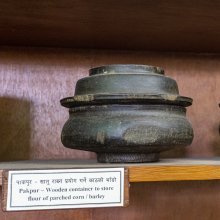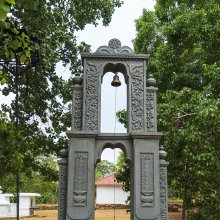Satu, Sātū: 9 definitions
Introduction:
Satu means something in Hinduism, Sanskrit, the history of ancient India, Marathi, biology, Tamil. If you want to know the exact meaning, history, etymology or English translation of this term then check out the descriptions on this page. Add your comment or reference to a book if you want to contribute to this summary article.
Images (photo gallery)
India history and geography
Source: What is India: Epigraphia Indica volume XXXI (1955-56)Sātū is one of the Brāhmaṇa donees mentioned in the “Asankhali plates of Narasiṃha II” (1302 A.D.). When a grant was made to a large number of Brāhmaṇas, the chief amongst the donees seems to have been called Pānīyagrāhin especially. In the present record, though all the donees (e.g., Sātū) are referred to as Pāṇigrāhi-mahājana, their list is headed by a Brāhmaṇa with Pāṇigrahī as his surname.
These copper plates (mentioning Sātū) were discovered from the house of a Santal inhabitant of Pargana Asankhali in the Mayurbhanj State (Orissa). It was made when king Vīra-Narasiṃhadeva was staying at the Bhairavapura-kaṭaka (city, camp or residence).

The history of India traces the identification of countries, villages, towns and other regions of India, as well as mythology, zoology, royal dynasties, rulers, tribes, local festivities and traditions and regional languages. Ancient India enjoyed religious freedom and encourages the path of Dharma, a concept common to Buddhism, Hinduism, and Jainism.
Biology (plants and animals)
Source: Wisdom Library: Local Names of Plants and DrugsSatu in the Marathi language is the name of a plant identified with Hordeum vulgare L. from the Poaceae (Grass) family. For the possible medicinal usage of satu, you can check this page for potential sources and references, although be aware that any some or none of the side-effects may not be mentioned here, wether they be harmful or beneficial to health.
Source: Google Books: CRC World Dictionary (Regional names)Satu in India is the name of a plant defined with Hordeum vulgare in various botanical sources. This page contains potential references in Ayurveda, modern medicine, and other folk traditions or local practices It has the synonym Zeocriton distichon (L.) P. Beauv. (among others).
Example references for further research on medicinal uses or toxicity (see latin names for full list):
· A Botanical Materia Medica (1812)
· Essai d’une Nouvelle Agrostographie
· Species Plantarum (1753)
· Synopseos Plantarum (Persoon) (1805)
If you are looking for specific details regarding Satu, for example side effects, diet and recipes, pregnancy safety, health benefits, extract dosage, chemical composition, have a look at these references.

This sections includes definitions from the five kingdoms of living things: Animals, Plants, Fungi, Protists and Monera. It will include both the official binomial nomenclature (scientific names usually in Latin) as well as regional spellings and variants.
Languages of India and abroad
Marathi-English dictionary
Source: DDSA: The Molesworth Marathi and English Dictionarysātū (सातू).—m (saktu S) Barley, Hordeum hexastichon. 2 Flour of parched barley, wheat, and gram (as eaten for pharāḷa &c.)
Source: DDSA: The Aryabhusan school dictionary, Marathi-Englishsātū (सातू).—m Barley; flour of parched barley, wheat, and grain.
Marathi is an Indo-European language having over 70 million native speakers people in (predominantly) Maharashtra India. Marathi, like many other Indo-Aryan languages, evolved from early forms of Prakrit, which itself is a subset of Sanskrit, one of the most ancient languages of the world.
Sanskrit dictionary
Source: Cologne Digital Sanskrit Dictionaries: Cappeller Sanskrit-English DictionarySātu (सातु).—[masculine] receptacle.
Source: Cologne Digital Sanskrit Dictionaries: Monier-Williams Sanskrit-English Dictionary1) Sātu (सातु):—[from sā] a m. ([probably]) the womb (as conceiving), [Ṛg-veda]
2) b See p. 1196, col. 3.
[Sanskrit to German]
Sanskrit, also spelled संस्कृतम् (saṃskṛtam), is an ancient language of India commonly seen as the grandmother of the Indo-European language family (even English!). Closely allied with Prakrit and Pali, Sanskrit is more exhaustive in both grammar and terms and has the most extensive collection of literature in the world, greatly surpassing its sister-languages Greek and Latin.
Kannada-English dictionary
Source: Alar: Kannada-English corpusSatu (ಸತು):—[noun] 'a ductile, bluish-white metallic element, used in making galvanized iron, brass, and other alloys, and as an electrode in batteries, etc.; zinc (symbol: Zn.).'
--- OR ---
Satu (ಸತು):—[noun] physical strength of the body.
Kannada is a Dravidian language (as opposed to the Indo-European language family) mainly spoken in the southwestern region of India.
See also (Relevant definitions)
Starts with (+21): Satua, Satubaka, Satuga, Satugedu, Satugumdu, Satuhina, Satuin, Satukarisu, Satul, Satula, Satulakayi, Satuli, Satullapakayika, Satum-bare, Satun, Satuna, Satunga, Satuo, Satupa, Satuppada.
Ends with: Apasatu, Apsatu, Asatu, Bisatu, Gasatu, Hosatu, Ishatu, Kaduvosatu, Kakshatu, Kasatu, Khalasatu, Kurnisatu, Msatu, Nipposatu, Nisatu, Posatu, Ruksatu, Sakshatu, Sishasatu.
Full-text: Satuvu, Satava, Satuva, Saktu, Sattu, Athara Upadhanyem, Sho, Druhyu, Itthi, Sita.
Relevant text
Search found 7 books and stories containing Satu, Sātū, Sātu, Saatu; (plurals include: Satus, Sātūs, Sātus, Saatus). You can also click to the full overview containing English textual excerpts. Below are direct links for the most relevant articles:
Vedic influence on the Sun-worship in the Puranas (by Goswami Mitali)
Sun-worship Vratas (12) Kalyāna-saptamī < [Chapter 5 - Rituals Related to the Sun-Worship in the Purāṇas]
Rig Veda (translation and commentary) (by H. H. Wilson)
Rig Veda 4.6.7 < [Sukta 6]
Gleanings < [March 1937]
A Glimpse into Sinhalese Poetry < [May, 1928]
Bengali Improvisators < [Jan - Feb 1939]
Tiruvaymoli (Thiruvaimozhi): English translation (by S. Satyamurthi Ayyangar)
Pasuram 3.7.1 < [Section 7 - Seventh Tiruvaymoli (Payilum Cutar oti)]
Elephantology and its Ancient Sanskrit Sources (by Geetha N.)
The Brahmanda Purana (by G.V. Tagare)
Chapter 36 - The Lineage of Manu: Manvantaras < [Section 2 - Anuṣaṅga-pāda]



